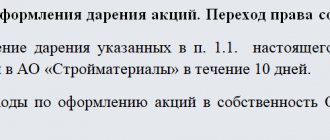An exchange agreement is a multilateral agreement providing for the obligation of the parties to transfer ownership of any property (movable or immovable) or goods. Both parties act as the seller. The parties mutually undertake to convey it and accept it. Very often, disputes arise regarding an exchange agreement between the parties.
In this legal relationship, the subject of exchange is a product, which includes:
- residential and non-residential premises;
- land;
- finished products of own production;
- vehicles;
- shares in the authorized capital of LLC;
- stock;
- components and assemblies of vehicles;
- shares in property rights;
- things;
- property rights of citizens and legal entities
The list is not exhaustive, but in each specific case a thorough legal examination of the goods subject to exchange is required. Things and goods must belong to the parties to the agreement.
USEFUL : watch the VIDEO with tips on what needs to be taken into account when concluding any contract, incl. exchange agreement, write your question in the comments of the video
Essential terms of the exchange agreement
The necessary (essential) conditions of the exchange agreement are:
- name of the thing (product);
- its quantity.
Please note: the provisions must be stated in the text. Their absence entails recognition of the barter agreement as not concluded (more information about the signs of non-conclusion of the agreement at the link).
It is recommended that documents reflect:
- The deadline for transferring a thing (goods) or from a literal interpretation it can be determined that the thing (goods) must be transferred;
- Consequences of failure to comply with the transfer. The party to whom the thing is not transferred by the time specified in the document may not fulfill its obligations or completely refuse them;
- The subject of the transaction must be the property of the parties. Otherwise, the party whose rights are infringed has the right to legally return the exchanged goods and demand compensation for losses;
- The obligation of the owner of a thing to compensate the counterparty for the difference in commodity value if its price is lower than another;
- The need to pay costs arising from the transfer (transport, delivery, etc.)
Important: registration of the agreement in Rosreestr involves two stages of transfer of ownership. However, it is not mandatory; read what disputes under the exchange agreement may arise and how to avoid them by following the link.
USEFUL : watch the video on how to avoid risks when concluding an exchange agreement
Item
Information about the subject of the contract is the basis of any agreement. In the case of an exchange agreement, the object itself is the property itself, which is exchanged by the Counterparties. At the same time, it is important to indicate comprehensive characteristics of this property so that no disagreements arise later. In an exchange agreement where the subject is residential premises owned by the Counterparties, the following characteristics are indicated: - the address at which the residential premises are located; — the floor on which the apartment is located; - the number of square meters in the apartment; — number of rooms; So, information about the subject of the agreement in the text of the document is written as follows:
The parties, in accordance with this agreement, transfer to each other the following residential premises belonging to them by right of ownership: Dmitry Stepanovich Shestakov transfers in favor of Gennady Albertovich Seleznev an apartment located at the address: Kurgan region, Kurgan city, Lomonosova street, building 38 (Thirty-eight), 7 (Seventh) entrance, apartment 246 (Two hundred and forty-six), 18 (Eighteenth) floor. The apartment consists of 6 (Six) rooms, the total area is 65 (Sixty-five) square meters. Seleznev Gennady Albertovich, in turn, transfers in favor of Dmitry Stepanovich Shestakov an apartment located at the address: Kurgan region, Kurgan city, Lenin street, building 47 (Forty-seven), 6 (Sixth) entrance, apartment 423 (Four hundred twenty-three), 11 (Eleventh) floor. The apartment consists of 5 (Five) rooms, the total area is 66 (Sixty-six) square meters. At the time of the exchange, the actual cost of each of these apartments, according to both parties, was set at 2,000,000 (Two million) rubles 00 kopecks. The parties are the owners of residential premises based on the provision of an extract from Rosreestr. The apartments do not belong to third parties by right of ownership, are not under mortgage or under arrest.
How to draw up an agreement for the exchange of shares in an apartment?
Each participant acts both as a seller and as a buyer. The document reflects:
- personal and passport information of premises owners;
- size of the share in ownership (in numbers and in words);
- the size of the total and living area of the premises;
- assessment of the share by BTI specialists;
- conclusion of a certified appraiser of the market value of the share;
- passport details of persons who live in the premises;
- technical characteristics of the object of the agreement, according to the title documents;
- an indication that the shares are equal (or the size of the difference and the timing of its payment to the party whose property is valued higher are determined);
- legal grounds for ownership, use and disposal of shares and transfer of ownership from the previous owner;
- deeds of transfer of the parties
PROFITABLE : let's entrust the drafting of the contract to our lawyer?
Under special control
The use of non-monetary forms of payment has a number of advantages over conventional ones carried out through bank accounts:
- banking costs are reduced;
- time savings are achieved;
- there is no need to exclude funds from circulation.
But when using non-cash forms of payment, it is necessary to take into account that such transactions have always attracted the attention of the tax authorities, since when they are carried out, funds do not pass through accounts in credit institutions or the cash desk of the enterprise. This circumstance significantly complicates control by fiscal authorities.
In addition, in the case of using the classic version of commodity exchange, that is, when one property is exchanged for another of equal value, there is no goal of making a profit. Then the meaning of commercial activity, which is precisely generating income, is lost. This circumstance also inevitably attracts the attention of regulatory authorities. Therefore, when making such calculations, it is necessary to have an idea of their legal basis.
It is worth paying special attention to the fact that tax authorities have the right to control barter transactions on the basis of clause 2 of Art. 40 Tax Code of the Russian Federation. And if the deviation of the transaction price from the market price is more than 20%, then the inspectors can recalculate the results of the transaction at market prices and charge additional taxes (Clause 3 of Article 40 of the Tax Code of the Russian Federation).
If the exchange agreement does not agree on the name and quantity of the goods to be transferred to one of the parties, then the agreement is not concluded.
How to draw up a car exchange agreement?
This type of agreement is concluded both between citizens and with the participation of enterprises and organizations. Vehicle prices may vary. In this case, the owner of the more expensive car is paid the difference in price. In the document, counterparties reflect:
- installation and personal data;
- locality and date of conclusion of the contract;
- information confirming ownership (car passport and registration certificate);
- technical characteristics and unit numbers (in accordance with the legal documentation);
- an indication of the absence of encumbrances and restrictions that would prevent registration actions;
- terms of termination of the transaction;
- the amount of the price difference and the procedure for making additional payments (if necessary);
- signatures of the parties to the agreement
What is it needed for?
Why is it necessary to conclude an apartment exchange contract with an additional payment?
One party enters into an agreement to improve living conditions with minimal costs and inconvenience.
The second side sees the benefit from it in the opportunity to receive a significant amount of money at a time and reduce utility bills when living in a smaller apartment.
There are pros and cons to the acquisition/sale of housing by concluding such a contract, instead of a purchase and sale transaction.
Find out what documents are required to exchange an apartment, as well as whether it is possible to exchange a room for a house and land, from our articles.
What does notarization of an exchange agreement provide?
In most cases, the exchange is drawn up in a document of any form, which is signed by the owners of the property. There are a number of exceptions when the exchange is registered by a notary. This:
- agreements with minors or persons who are not aware of their actions and cannot manage them;
- real estate share exchange agreements
Agreements that require mandatory notarization and do not undergo this procedure are declared invalid. In this case, the participants are obliged to return the property to the previous owners or compensate it in cash.
USEFUL : We currently have a special offer for drawing up any contract within 24 hours, watch the video for more details and write your question in the comments of the video
Rights and obligations of the parties
In this case, each participant is the seller of the apartment and is obliged to transfer it, and the buyer of the apartment is obliged to accept it. Each participant is obliged :
- Transfer the apartment(s): free from the rights of other persons; with all equipment, documents; in the quantity specified in the agreement; exactly the one specified in the agreement; acceptable quality; with door, glazed windows and keys; in the agreed configuration.
- Report any violation of the terms of the agreement within a reasonable time.
- Accept the transferred housing.
Conditions and grounds for termination
Termination of the exchange agreement can be carried out under the following conditions:
- Essential terms of the contract have been violated.
- The transaction was recognized as imaginary or feigned.
- The hidden incapacity of one of the parties to the contract was discovered.
- One of the parties was (at the time of the transaction) a minor and his interests were violated.
- Disagreement between the guardianship and trusteeship authorities was discovered.
Despite all the apparent confusion and complexity, the presence of costs and other nuances, exchange transactions are the most accessible and allow citizens to realize their own property interests at minimal costs.
If you find an error, please select a piece of text and press Ctrl+Enter.
Differences in registration between individuals and legal entities
Real estate exchange agreements can be concluded both between individuals and legal entities. The differences between such documents are minimal, but they still exist.
In the case of legal entities, contractual documents must contain information about the legal entity:
- date and place of registration;
- legal addresses;
- bank accounts through which additional payments will be made (in the case of unequal exchange), etc.
Account information is also necessary to pay the taxes and duties required in these cases.
Such contracts differ in how they are filled out. So, if the introductory part of a document for individuals contains only passport data of individuals, then in the case of a legal entity. persons, in addition to their name, it is necessary to indicate the details of the person (or persons) authorized to sign all the necessary papers and all related documents.
If for some reason, after drawing up an agreement, the authority to sign it is transferred to another person, a notarized power of attorney issued to that person is attached to the agreement.
Attention! Contractual documentation must necessarily include information about the duration of the contract, the rights, obligations and responsibilities (in case of violation) of the parties.
We invite you to read other useful publications by our experts, which talk about the nuances and rules of conducting exchange transactions with real estate such as:
- residential premises received under a social lease agreement;
- land;
- apartments located in different localities;
- housing exchanged only for the period of vacation.
How is it drawn up for the exchange of real estate for similar property?
Drawing up a real estate exchange agreement implies a clear understanding of the structure of the exchange process itself. To correctly draw up such an agreement, you should decide on the following points:
- Subject of the agreement. This can be either private property - houses, apartments, cottages and other residential and non-residential premises that are privately owned, as well as real estate owned by any organizations or enterprises - household or warehouse space, office space, workshops, etc. (we talked about how to correctly conclude an agreement for the exchange of residential premises between owners here).
When drawing up an exchange agreement, it is necessary to clearly state all the features of the real estate being exchanged (location of the object, its condition, square footage, etc.). This will significantly simplify the exchange process and avoid possible disagreements between the parties. - Drafting rules, important points and elements. As mentioned above, the legislation does not provide for a clearly defined form for an exchange agreement. For this reason, the basis for its preparation is the fact of counter-purchase and sale.
In this case, the following data must be included in the contract: the cadastral number of the objects, the area of the exchanged objects (with the attachment of floor plans or copies thereof), if at least one of the exchanged objects includes a land plot adjacent to it, it is necessary to indicate its target purpose (read more about the nuances of drawing up an exchange agreement in which the object is a land plot here).The estimated cost of the objects is also indicated, which allows you to determine whether one of the parties needs to make an additional payment.
- Determination of the contract price. If the exchange agreement does not stipulate the value of the objects to be exchanged, then it is assumed that they are of equal value. Responsibilities for paying the costs of preparing the necessary documentation are agreed upon by the parties and then specified in the contract. This is consistent with the requirements set out in paragraph 1 of Article 568 of the Civil Code of the Russian Federation.
If the value of the exchanged objects is indicated in the contract, their assessment must be carried out exclusively by government organizations authorized to carry out such assessment. In this case, this also includes a clause indicating an additional payment, the amount of which corresponds to the difference in the estimated value of the exchanged objects.Important! All assessment documentation must be certified by the seals and stamps of the relevant organizations.
Taxes
If objects that are objects of exchange are recognized as equivalent, then neither party is the recipient of economic benefits in kind and in this case the payment of any taxes is not provided.
In the case of unequal value of the exchanged objects, the person receiving the additional payment is obliged to pay tax on the amount he receives, since, according to Article 567 of the Civil Code of the Russian Federation, such a person is equated to the seller of the property. The amount of tax paid should be clarified with the state tax office at the time of the transaction.
State registration
In order for a real estate transaction to be legal, the data must be entered into the Unified State Register of Real Estate, otherwise, a transaction concluded without state registration is invalid.
Nuances of the procedure
It is not the purchase and sale or exchange agreement itself that is registered in the Unified State Register of Real Estate, but the ownership rights to housing. However, since contracts are the basis for changing the scope of rights and the circle of persons to whom they belong, they must be submitted to Rosreestr.
The overall procedure looks like this:
- The party registering the right pays a fee and submits an application and accompanying documents to the registration authority.
- The authority makes an entry in the Unified State Register of Real Estate about new rights to real estate.
- The party receives an extract from the Unified State Register confirming its rights.
Where to contact?
You can submit documents for registration in the following ways:
- Apply for an appointment at your local Rosreestr office.
- Submit an application through the MFC using the “My Documents” type.
- Submit an application electronically through the State Services portal (registration and account confirmation there will be required).
What documents are needed?
To register property rights you will need:
- Statement.
- A copy of the agreement, signed by both parties, with the attached deed of transfer.
- Applicant's passport.
- Receipt for payment of state duty.
If necessary, the registration authority may request additional documents.
Timing and cost
According to the Federal Law “On State Registration of Real Estate”, data in the Unified State Register must be registered no later than 7 days from the date of filing the application (if there were no grounds for suspending registration).
However, if the documents were submitted through the MFC, the period is increased by another 2 working days required to transfer the documents to Rosreestr and back. The cost of registration is established by the Tax Code of the Russian Federation. As of 2021, it is equal to 2000 rubles.









